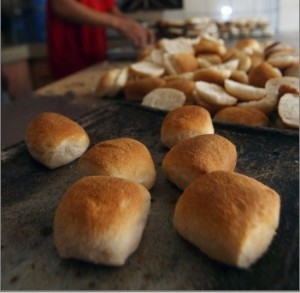Millers refute need to hike bread prices too much; bakers disagree
MANILA, Philippines—The prices of Pinoy Tasty and Pinoy Pandesal are set to rise on Aug. 20, after the Department of Agriculture (DA) recommended a hike in the tariff on low-priced Turkish flour.
In a joint statement, the Filipino-Chinese Bakery Association Inc. (FCBAI), Federation of Bakery Association Inc. (PFBAI) and Philippine Baking Industry Group (PhilBaking) said they would raise the price of Pinoy Tasty by P3 per loaf to P40 and Pinoy Pandesal by P1.50 to P24 per 10-piece pack.
FCBAI and PFBAI group bakery chains and neighborhood bakeries together, while PhilBaking represents the country’s biggest bread brands like Gardenia.
But the prices of bread and bakery products should not go up anytime soon considering that flour importers increased their imports of Turkish flour as the DA pushed for antidumping duties, according to local millers.
Ric M. Pinca, executive director of the Philippine Association of Flour Millers (Pafmil), said that contrary to bakers’ claims, the price of Pinoy Tasty should go up by only 65 centavos per loaf while that of Pinoy Pandesal by only four centavos per piece.
The bakers groups said importers of Turkish flour had advised them that supplies would not be available beginning September. Bakers are now panic-buying Turkish flour before it will disappear next month, they said.
“The imposition of a 20-percent safeguard tariff on imported flour from the current 7 percent made the lower-priced flour immediately unavailable. Since the cheaper imported flour will no longer be available, bakers will have no choice but to shift to higher-priced locally-milled flour. This will result in higher prices of Pinoy Tasty and Pinoy Pandesal,” PhilBaking president Walter Co said.
Ensure continuous supply
“We cannot get imported flour anymore as there’s already a scarcity in supply, but we have to ensure the continuous supply of Pinoy Tasty and Pinoy Pandesal for the consumers,” he added.
But Pinca refuted this, saying that incoming Turkish flow shipments were expected this month and the next, and at bigger volumes.
He said that in July alone, 14,000 metric tons or 594,700 bags of Turkish flour arrived. This was 54 percent more than the volume landed in June, he added.
“Obviously the importers are taking advantage of the low duty on Turkish flour,” Pinca said. “This volume (July arrival) is enough for two months’ consumption. Therefore, bakers do not have any reason to raise prices for the next two months.”
He added that additional shipments were scheduled to arrive this month and in September, both in anticipated higher volumes.
Trade Secretary Gregory L. Domingo on Thursday said bakers should not raise the prices of the affordable Pinoy bread products. If necessary, the increase should be parallel with the country’s inflation rate of about 3 percent. A more reasonable increase, if it cannot be helped, should be somewhere around a peso only.
Trade Undersecretary Zenaida C. Maglaya echoed Domingo, noting that the planned price increase by bakers was “too high” and “too early.”
Maglaya said the increase was too high because Turkish flour would roughly account for only 30 percent of the flour used in making the Pinoy bread products, so any price impact should not be passed on fully to the consumers.
The increase, she added, should be less than P2 per loaf. Also, there are still incoming shipments of Turkish flour, which means that bakers could still further delay the increases they announced yesterday.
According to Maglaya, the Philippine Association of Flour Millers (Pafmil) had committed to the Department of Trade and Industry (DTI) that local industry players would not increase their flour prices until end-December this year.
Currently, importation carries a 7-percent duty. But the DA has proposed to raise this to 20 percent, a level provided to combat dumping.
Dumping is defined as the export of a product to a foreign market at prices that are lower than that prevailing in the home market.
Last week, the DA asked the Tariff Commission whether or not provisional antidumping duties may be imposed pending the result of its preliminary investigation on whether the unfair trade practice was actually happening.
In a letter dated July 29, Tariff Commission Chair Edgardo B. Abon said such duties “can only be imposed following the affirmative preliminary finding of dumping” and injury to a local industry.
Regarding price hikes, Pinca said the bakers had done their math wrong.

